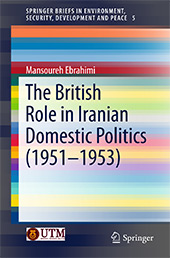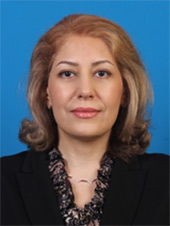|
|
| |
|
| |


SpringerBriefs in
Environment, Security, Development and Peace (ESDP)
A Peer-reviewed Book Series
Edited by
Hans Günter Brauch,
AFES-PRESS, chairman
Free University of Berlin (Ret.)
 |
Mansoureh Ebrahimi: The British Role in Iranian Domestic Politics (1951-1953). SpringerBriefs in Environment, Security, Development and Peace, vol. 5 (Heidelberg – Dordrecht – London – New York: Springer-Verlag, 2016).
ISBN (Print): 978-3-319-31097-8
ISBN (Online/eBook): 978-3-319-31098-5
DOI: 10.1007/978-3-319-31098-5
Order this book on the Springer Website |
| |
|
About this book
How and why was Iran’s democratically elected government overthrown in 1953? Most studies refer to a ‘CIA-led’ operation. Based on British and Iranian sources, Dr. Ebrahimi, Universiti Teknologi Malaysia, examines how British foreign and domestic agents interfered in Iran’s internal affairs between Iran’s nationalisation of oil in 1951 and the overthrow of Prime Minister Mosaddeq in 1953. This study analyses how British agents used the Shah, the ancient Persian Durbar, Majlis deputies, Islamic clergy and Iranian army officers in the overthrow of the first democratically elected Prime Minister. The book highlights how Britain used the ‘Communist threat’ as a pretext to protect its oil interests and persuaded the Americans to execute the coup. This close interaction between British colonial interests, American Cold War goals and Iranian politics defeated the democratic aspirations of Iran’s people.
-
Analysis of primary sources from the Public Record Office in London and of contemporary newspaper articles in the Iranian, British and American press.
-
Critical assessment of the historical and political literature on the Anglo-American coup against Mohammed Mosaddeq in August 1953.
-
Interview with Mohammad Ali Amouei, an eyewitness and former Secretary General of the Central Committee of Tudeh Party of Iran.
Contents
-
British Interest in Iran’s Oil: Prelude to Conflict
1.1 The Iranian Economy
1.2 Preliminary Assessments of Unfair Agreements
1.3 Iran Objects: Revision of the Oil Agreement
1.4 The Nationalisation of Oil
1.5 Organisation of the Book References
-
British Retaliation after the Nationalisation of Iran’s Oil
2.1 Apparent Calm: Negotiations
2.1.1 Collapse of Discussions with the World Bank
2.2 Violence and Military Threat
2.3 Sending Spies to Iran
2.4 Legal Action
2.5 British Propaganda and Consultation with the Americans
2.6 The Oil Boycott 2.7 Conclusion References
-
British Interference in Iranian Internal Politics
3.1 Tehran in Protest: The Prelude
3.2 The British Action: Their Candidates for PM
3.2.1 The Shah’s Opinion
3.3 Struggle for Power
3.3.1 Resignation of Dr. Mosaddeq
3.3.2 Qavām’s Four Days as PM and the Uprising of 21 July 1952 (30 Tir 1331)
3.3.3 The Reaction of the National Front and the Shah to Qavām as PM
3.3.4 Impact of the Uprising (21 July 1952/30 Tir 1331)
3.4 Demonising Communism
3.5 The Truman–Churchill Proposal: Dr. Mosaddeq’s Assessment
3.6 The Plan to Overthrow Dr. Mosaddeq’s Government
3.7 Conclusion References
-
Diverse Strategies Solidify Amid Anti-Mosaddeq Sentiment
4.1 The Durbar: Arouse the Shah
4.2 The Presence of the Clergy
4.3 The Shake-up of the Majlis
4.4 The Second Extension of Dr. Mosaddeq’s Authority: Increasing Opponents
4.5 Further Internal Political Disturbances and the British Plot
4.5.1 The Riot of Bakhtiyārī in February 1953
4.5.2 The Infamous Plot to Murder Afshār Ṭūs in April 1953
4.5.3 Selecting a PM for the Post-Coup Government
4.6 The Proposed Referendum and the Proposed Departure of the Shah
4.6.1 The British Plot to Assassinate Dr. Mosaddeq: Events of 28 February 1953 (9 Esfand 1331)
4.6.2 The Aftermath
4.7 Conclusion References
-
Decisive Crackdown and Concluding Remarks
5.1 The Final Blow to Dr. Mosaddeq’s Government
5.2 Dr. Mosaddeq’s Pre-emptive Measures
5.3 Understanding the Past, Looking to the Future References
Appendix: Scope, Data, Methodology and Limitations
About the Universiti Teknologi Malaysia (UTM)
About the Author
About the Book
On the Author
 |
Mansoureh Ebrahimi (Suri), PhD, is a senior lecturer with the Faculty of Islamic Civilization, Universiti Teknologi Malaysia. Suri has written about Iran’s culture, history, religious beliefs and Malaysia’s halal industry from the Islamic perspective. She also teaches Persian and Philosophy of Science and Civilization. Among her major publications are: Mansoureh Ebrahimi and Kamaruzaman Yusoff (Eds.): The Halal Industry in Malaysia: Prospects and Challenges (Malaysia: UTM Press, 2015); “Traditional and Cultural Beliefs vis-à-vis National and Religious Myths in Sohrab Sepehri’s The Traveler”, in: Asian Social Science, (Toronto: Canadian Center of Science and Education), 11,15 (2015): 180-186; “The British Plot to Remove Iran’s Democratically Elected Prime Minister from Power”, in: Acta Histriae (Slovenia: Società storica del Litorale-Capodistria), 23, 4 (2015): 735-748.
|

About the Universiti Teknologi Malaysia (UTM)
Starting modestly as a Technical School for Teachers in 1904 and then becoming a Technical College in 1946, the Universiti Teknologi Malaysia (UTM) was established as a university in 1975. UTM educates graduates in science, technology and engineering. As a premier university in these fields, UTM aims to become a renowned technological research university. Its strategic goals are:
-
To contribute to human capital development by providing quality education;
-
To provide leadership and contribute through research and innovation;
-
To achieve a desirable image and branding that fulfils the requirements of stakeholders; and
-
To contribute to society through community engagement and outreach.
In this endeavour, UTM aims to strengthen its excellence by ensuring quality through:
-
Excellent staff with the best qualification, dedicated to continuous improvement in their respective disciplines and multidisciplinary fields, having exemplary reputation and outstanding credibility, recognised and acknowledged for their research excellence and innovative culture;
-
A conducive teaching and learning environment and effective atmosphere for optimal learning supported by state-of-the-art facilities and competent support staff;
-
High-quality student intake that are trained to be graduates with a balance of scholastic achievement and co-curricular involvement to ensure quality and excellent human capital;
-
Smart partnerships and strategic alliances with industries and stakeholders resulting in meaningful collaboration and synergy;
-
Internationalisation efforts to enhance networking, collaboration and synergistic alliance with renowned and established universities to achieve respectable standing.
With its focus on excellence in science, technology and engineering, UTM’s main objective is to produce technocrats who are competent and responsible to the Creator and their community. UTM aims to develop excellence in science and technology for universal peace and prosperity, in accordance with His Will. UTM wants to become a world-class centre of academic and technological excellence and a leader in the development of human capital and innovative technologies that will contribute to the nation’s wealth creation.
UTM offers a wide range of academic programmes in these faculties:
-
Built Environment: Architecture, Landscape Architecture, Quantity Surveying, Urban and Regional Planning
-
Civil Engineering: Structure and Materials, Hydraulics and Hydrology, Geotechnics and Transportation, Environmental Engineering, Information Technology
-
Electrical Engineering: Control and Instrumentation Engineering, Electronics Engineering, Microelectronics and Computer Engineering, Mechatronics and Robotics, Telematics and Optical Communication Engineering, Radio Communication Engineering, Electrical Power Engineering, Energy Conversion, Information Technology
-
Islamic Civilization: Islamic Educational Thought and Methodology, Islamic Culture & Globalization, Shariah, Law and Economy, West Asia Civilization
-
Mechanical Engineering: Aeronautical Engineering, Automative Engineering, Applied Mechanics, Design, Manufacturing & Industrial Engineering, Marine Technology, Materials Engineering, Thermo-Fluids, IT Management
-
Management and Human Resource Development: Management, Human Resource Development, Modern Languages
-
Science: Mathematics, Chemistry, Physics
-
Computer Science and Information System: Information System, Software Engineering, Computer Graphics and Multimedia, Modelling and Industrial Computing, Computer System & Communication
-
Education: Science and Mathematics, Foundation Education, Social Science, Technical Educa¬tion and Engineering, Multimedia Education
-
Biomedical and Health Science Engineering: Therapy & Rehabilitation
-
Bioscience and Bioengineering: Biology Science, Industry Biology
-
Chemical and Natural Resources Engineering: Chemical Engineering, Petroleum Engineering, Gas Engineering, Polymer Engineering, Bioprocess Engineering
-
Geoinformation Science and Engineering: Geomatics Engineering, Geoinformatics, Remote Sensing, Real Estate Management, Land Administration & Development
These academic programmes provide opportunities for individuals to nurture their potential, fulfil their purpose and achieve their vision. With the development of generic skills, UTM aims to enhance students’ character and train a competitive future generation. Through its learning experience, UTM enables its graduates to pursue their career in a competitive and challenging local and global environment and ultimately harness their true potential.
UTM encourages the formation of Centres of Excellence to promote research and development in various disciplines. Among them are:
-
Institute for Environmental & Water Resource Management (IPASA)
-
Chemical Engineering Pilot Plant (CEPP)
-
Ibnu Sina Institute for Fundamental Research (ISS)
-
Automotive Development Centre (ADC)
-
Institute of High Voltage & High Current (IVAT)
-
Centre for Artificial Intelligence & Robotics (CAIRO)
-
Institute of Coastal & Offshore Engineering (COEI)
-
Centre for Real Estate Studies (CRES)
-
Institute of Advanced Information Technology (AITI)
-
Steel Technology Centre (PTC)
-
Wireless Communication Centre (WCC)
-
Marine Technology Centre (MTC)
-
Centre for Advanced Software Engineering (CASE)
-
Gas Technology Centre (GASTECH)
-
Composite Centre (CC)
-
Institute of Noise and Vibration (IKG)
-
Centre for Rural Development Study (PKPLP)
-
Centre for Malay Architecture Study (KALAM)
-
Centre for Technology Policy & International Study (CENTEPIS)
-
Centre for Lipids Engineering Applied Research (CLEAR)
To encourage a more vibrant research environment at the university, 11 UTM Research Alliances have been formed to strengthen research and promote expertise in various disciplines. These include: Water, Biotechnology, Construction, Frontier Science, Production and Material, K-Economy, Sustainability, Cybernetics, Transport Technology, Information Communication.
UTM provides a most enriching and versatile teaching and learning environment for the academic staff and students. In addition, the learning environment in UTM inspires intellectual curiosity and inquisitiveness, while enhancing and harnessing students’ creativity and innovative quality. This will encourage outstanding staff and student performance and achievement.
UTM is, therefore, committed to development and advancement in science, engineering and technology, and also leads in the development of competitive and creative human resource and technology to meet the country’s aspiration towards creating quality human capital, in tandem with the nation’s quest for continuous progress and prosperity.
|
|
|